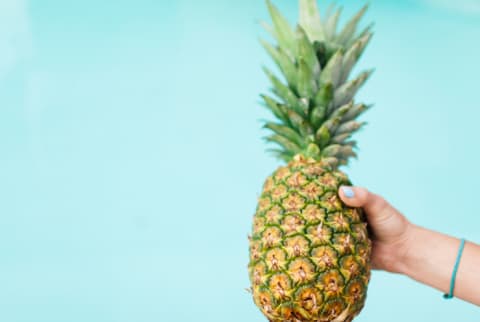Advertisement
9 Nutrients You Need For Great Sleep + How To Get More Of 'Em



Shawn Stevenson, host of popular wellness podcast Model Health Show, maintains that he "could not have found my road back to health without first paving a way to better sleep." In his new book, Sleep Smarter: 21 Essential Strategies to Sleep Your Way to a Better Body, Better Health, and Bigger Success, Stevenson combines his years of research to reveal the most effective ways we can all optimize our shut-eye. In this excerpt, he explains how eating right can improve your sleep. You can also learn more about better sleep (and maximizing your energy!) in his new mindbodygreen video class.
When it comes to getting the nutrients you need to keep your body and sleep healthy, remember this: food first.
Of course, there are occasions to strategically add in some smart supplementation to help fill in the nutritional gaps and get things back in line from a lifetime of deficiency. But the reason food is so paramount to getting these nutrients is that your body has evolved to “recognize” the nutrients that it can extract from whole foods.
There’s no guarantee that your body is going to readily assimilate the vitamin C from a supplement just because the pill bottle says it’s in there. Your cells and healthy gut bacteria are more likely to play nicely with real food than any fancy supplement.
So what should you be eating to ensure a great night's rest? Here are some of the most important good-sleep nutrients and the best foods to find them in:
1. Selenium
A deficiency in selenium could play a role in sleep abnormalities. It’s also critical for your immune system function and thyroid function.
With selenium, a little bit can go a long way. Great sources are Brazil nuts, sunflower seeds, beef, oysters, chicken, and cremini mushrooms.
2. Vitamin C
Some research suggests1 that people with low blood levels of vitamin C have more sleep issues and are more prone to waking up during the night.
Excellent sources of vitamin C are superfoods like camu camu berry, amla berry, and acerola cherry, as well as more everyday foods like bell peppers, green leafy vegetables, kiwifruit, strawberries, citrus fruits, and papaya.
3. Tryptophan
This is a critical nutrient because it’s the precursor to your body’s serotonin production. The neurotransmitter serotonin is a precursor to the hormone melatonin, which is important for the body’s internal clock to regulate your sleep wake cycles.
Tryptophan is found in turkey, chicken, eggs, sweet potatoes, chia seeds, hemp seeds, bananas, pumpkin seeds, almonds, and yogurt.
4. Potassium
A study published in the journal Sleep found that potassium may be helpful for those who have trouble staying asleep. Bananas are often touted as the best source of potassium, but there are plenty of other natural sources.
Leafy greens, potatoes, dulse (a mineral-rich sea veggie), broccoli, cremini mushrooms, and avocados are excellent sources of potassium. If you love guacamole, this is probably the best news ever.
5. Calcium
Other research suggests2 that disturbances in REM sleep could be linked to a calcium deficiency.
Great sources of bioavailable calcium are kale, collard greens, mustard greens, sardines, sea veggies, and sesame seeds.
6. Vitamin D
According to the Journal of Clinical Sleep Medicine, there is a strong correlation between vitamin D deficiency and excessive daytime sleepiness.
There are a few food sources of vitamin D, such as swordfish, salmon, tuna, mackerel, shiitake mushrooms, and oysters, but the optimal way to get your vitamin D levels up, as the research indicates, is through smart exposure to natural sunlight.
Still, it isn’t always possible to get the adequate sunlight we need because of where we live, the protective sunscreen we wear, and the time of year we are outdoors. This would be a smart place to supplement, at least for part of the year, with a high-quality vitamin D3 supplement.
7. Omega-3s
A study conducted by the University of Oxford found that omega-3s can help you get deeper, more restful sleep.
Some food sources of omega-3s are chia seeds, pumpkin seeds, hemp seeds, walnuts, halibut, salmon, and flax seeds.
8. Melatonin
Melatonin (in relation to tryptophan, as mentioned above), is a hormone that regulates your sleep cycles and can be found in small amounts in some foods, while others could also help raise your body’s production of melatonin.
Tart cherries are far and away the food source with the highest amount of melatonin, but there is also a trace amount found in walnuts. Some of the foods that have been found to naturally boost your body’s melatonin levels are pineapples (the leader in one particular study), bananas, and oranges.
9. Vitamin B6
This essential vitamin helps to modulate your body’s stress response and relax your nervous system.
Some of the best sources of vitamin B6 are bananas, yogurt (sugar-free and organic, please!), cashews, peanut butter, almonds, avocados, fish, tomatoes, spinach, sweet potatoes, sea veggies, and eggs.
It should go without saying that these foods would ideally be organic and minimally processed. Of course, there are many other foods and nutrients that are important for human health. The great thing about eating real foods is that you’ll get a whole host of other nutrients that come along with the ones above—all in a delicious, bioavailable form.
Related reads: